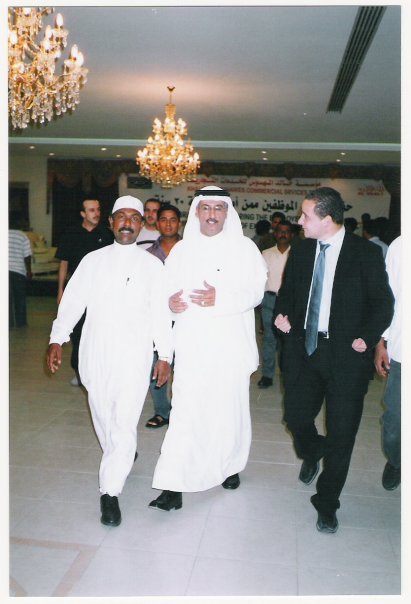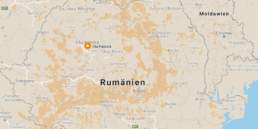 On 25th September 2011 King Abdullah of Saudi-Arabia announced he was giving Saudi women the right to vote and run in municipal elections, the only public polls in the ultra-conservative Gulf kingdom. “This is a small step, yet a giant leap,” says Les Anciens member Marcus Khoury, who worked as lawyer in that country and is currently residing in the United Arab Emirates. The former CD member, who is half-Lebanese and half-German by origin, told the Golden Oldie more about the situation of women on the Arab peninsula.
On 25th September 2011 King Abdullah of Saudi-Arabia announced he was giving Saudi women the right to vote and run in municipal elections, the only public polls in the ultra-conservative Gulf kingdom. “This is a small step, yet a giant leap,” says Les Anciens member Marcus Khoury, who worked as lawyer in that country and is currently residing in the United Arab Emirates. The former CD member, who is half-Lebanese and half-German by origin, told the Golden Oldie more about the situation of women on the Arab peninsula.
Golden Oldie: King Abdullah announced that Saudi women will get the right to vote. What was your reaction when you heard this news?
Marcus Khoury: Well, it’s great news. It’s a small step that under the given circumstances is a gigantic leap. Women will only be allowed to vote and candidate from 2015 onwards and only for local elections. Women will not yet be voting delegates into or candidating themselves for a position in a national parliament with legislative powers. There is no such legislative assembly, Saudi Arabia is still an absolute monarchy. But nonetheless this is Saudi Arabia, where, when I was still there not too long ago, the media reported about formal marriages conducted with ten year old girls, where primary school education became mandatory for girls in the past thirty years. Until now women may be allowed to buy a car, but are not allowed to drive it and risk police sanctions if they do drive.
Golden Oldie: Incredible…
Marcus: There is a shocking story which happened in Mecca, Saudi Arabia in March 2002. There is a special police force which checks that the strict rules of religion are followed. This force is called Mutawa. When a fire broke out in a girls’ school in Mecca in March 2002 Mutawa agents did not want to accept that some of the girls ran out of the burning school without wearing the correct Islamic dress, the black robe and the headscarf. These agents actually forced the girls back into the burning building, sometimes even beating them because they were not properly covered in public. Press reports stated that 15 girls died as a result of the fire. This has led to a wave of outrage in Saudi Arabia and things have already started to improve since then.
Golden Oldie: Can you tell more about the situation of women in Saudi-Arabia? What can they do, what can’t they do?
Marcus: The most striking element of every-day life in Saudi Arabia is the strict separation between the sexes – with all the contradictions that result out of maintaining such a traditional separation yet wanting to apply a modern 21st century lifestyle. A woman is not allowed to leave the house unless she is accompanied by her husband, son, brother or father. People can get arrested and men can be punished with public lashes if caught in public in the presence of a woman who is not their direct relative. Every restaurant, even American fast food stores, have a strictly separated family section and singles section. Obviously the singles section is only meant for single men, as single women are not allowed outside of their home without a close male family member. Some shopping malls are strictly families only or have families only days.
Golden Oldie: How is the dress-code for women?
Marcus: Women are still obliged to cover up in public in a black veil, called the abaya. The burqa is not mandatory. So you do occasionally see Saudi women who have only covered their hair and kept the face free. You also encounter many women who cover their faces in black, sometimes even their eyes. The labour authorities inspect offices that employ both women and men. In doing so, they check for compliance with the local rules, such as complete separation of the work environment for women and that for men.
Golden Oldie: How was it for you to work there?
Marcus: When I lived there, I always had this uneasy feeling whenever I interviewed a woman. Here I was sitting with her in one room without any of her male relatives, and may have therefore risked committing a violation of the local rules. The irony is that because women are not allowed to drive, they have to have male drivers, usually expat workers from Pakistan or India. Obviously they are not related to these. Yet a modern society would not be able to function at all without providing transportation to women.

Golden Oldie: How come that the conservative king made this policy turn now?
Marcus: My impression is that he is actually not that conservative. He is very modern, relatively speaking of course, if ever an absolute monarch can be considered modern. However, he is ruling a country that has come largely from a very harsh Bedouin desert lifestyle and jumped into the 21st century. Of course there have always been cities which through trade and a regular influx of pilgrims from all over the world were exposed to different cultures and mentalities. Nowadays more and more Saudis have through studies abroad had the chance to get acquainted with a modern lifestyle which also includes empowering women. Yet a large part may still not even have experienced women working outside of the traditional family roles.
Golden Oldie: So it’s not an easy situation for the king either?
Marcus: The King is in a tight spot where no one is satisfied. For some he will always have not gone far enough with reforms, whereas for others he has already gone too far and succumbed to Western pressures. Therefore I really do not envy him. Bear in mind the first target of Al Qaeda and Osama Bin Laden was the Saudi Royal family for having betrayed the true cause. Not too far away from Saudi Arabia there is also Iran. At least in the eyes of some the Shah in the seventies failed with his reforms, alienated his people and was toppled with the result of more indoctrinated religious zealots coming to power.
Golden Oldie: It sounds like there is no big hope for an Arab Spring in Saudi-Arabia…
Marcus: You have to bear in mind that Saudi Arabia is the country to which the former ousted Tunisian president Ben Ali has fled. Saudi Arabia is even the country which has sent tanks and armed soldiers to quell the uprising in neighbouring Bahrain a few months ago. Nevertheless there is this pressure of this Arab Spring. When Egyptians were demonstrating on Tahrir Square in Cairo, more and more Saudis were demanding the women’s right to drive, women were taking the steering wheel into their hands in spite of the rules, posting videos of women driving on Youtube and risking punishment. This Arab Spring definitely has enticed Arab leaders to ride the wave of reform before it lashes out against them. The same may apply to the media frenzy around the elections here in the United Arab Emirates, to which voters have to be selected. But never in the past so many voters have been selected. But to limit these recent changes to the Arab Spring would not do justice to the Saudis who have been requesting more empowerment for women even before the Arab Spring.
Golden Oldie: What reform steps are realistic in Saudi Arabia?
Marcus: The King and his team of reformers have begun introducing change to the country in little but important steps already a while ago. Under him major universities have been and are still being built. One for example for women only in Riyadh, the Princess Nour University, which the company I work for is building. And another the King Abdullah University of Science and Technology (KAUST), also constructed by my employer in Jeddah. There for example the usual local regulations of a strict separation between men and women don’t apply. Both sexes can attend the same courses in the same rooms, work together in the same labs and similar.
Golden Oldie: You mentioned that there is growing dissatisfaction in the population. From which groups in particular?
Marcus: I may be enforcing a possibly European model too heavily on a country only distinctly connected to it. However I do have the impression that it is a rising middle class, which started developing way before the Arab Spring, that started demanding more participation and a relaxation of some of the stricter rules. It is this middle class that already in my time was openly demanding in the press the possibility for women to drive, highlighting that most families, also in oil-rich Saudi Arabia, cannot afford hiring drivers, to take daughters to school and university and women to their work.
Golden Oldie: Do you think more steps for a bigger participation of women in Saudi-Arabia will follow?
Marcus: Yes. I think it is in the course of things. Already when I was there I was amazed by the contradictions in every-day life. Many people are fascinated with western lifestyles as shown on television, for example in popular American sitcoms, such as Friends, on the one hand. On the other hand there are rules in every-day life that impose traditions deeply rooted in a Beduin lifestyle on every-day society. When back in the early middle ages Beduins had the habit of attacking rival tribes and pillaging their resources, some of these rules may have made more sense to enforce a certain security for the whole tribe. This is far from applicable now. And it ends up in my colleague’s wife who because her husband was on a business trip in another city had to somehow get hold of her sickly old father so that she could take her daughter to the hospital.
Golden Oldie: Now you live in the United Arab Emirates. How is the situation of women compared to Saudi-Arabia?
Marcus: Different. The UAE has been far more open to different lifestyles for a variety of reasons. Early on different cultures, in addition to the Arab culture, such as from Iran or the Indian sub-continent settled down here and played a much more important and decisive role in every-day life and in developing the country. In Saudi Arabia a certain Islamic school, referred to as Wahhabism, became a unifying factor for a conflicted and very young, but also large country. It was a deal not unlike the one between Charlemagne and the Catholic Church. The religious Wahhabi leaders declared their ongoing moral support to the ruling Saud family and the Saud family enforced Wahhabism in every area they invaded. The name of the country Saudi Arabia comes from the name of that family Saud, originally from around Riyadh. Now in comparison, the UAE is even far younger, only established as a federation of emirates in 1973, but also far smaller. And without the political necessity of one tribe imposing a political Islamic doctrine on the others.
Golden Oldie: Do you have female co-workers?
Marcus: Yes, even in higher managerial positions.
Golden Oldie: How did they and your male co-workers react to the news from the neighbouring country?
Marcus: Generally positive. Independent of the ideological, political reasons, human rights and gender equality related reasons, there is some credit which needs to be given to the consideration that a society which excludes more than half of its own from the contributing work force, which excludes women or limits their participation, is hardly viable in the long run. I mean not just contributing in the tax-paying sense, but in contributing such as in the work done to develop society and bring it further, work done by doctors, teachers, judges, urban planners and similar.
Golden Oldie: What about the other countries on the Arab peninsula – where do women have most rights, where least rights?
Marcus: Call me a patriot, but I would say Lebanon. Education does play a very large role. And Lebanon as a small country with hardly any resources at all, no major industry, but always at the crossroads between cultures, knew how to count on education. Many judges in Lebanon for example are women and are not intimidated by imposing their lawful decisions on men.
Golden Oldie: Are there feminist movements in the region?
Marcus: Yes. But you do have to pay attention and prevent doing something which I may have been doing myself throughout these answers, using a paradigm with expectations resulting out of and applicable on a Western culture. Some may have the point of view that the lack of existence of a feminist movement per se does not necessarily need to equate to a lack of progress, or simply because such a movement may mean progress in the west that may not need to apply strictly speaking elsewhere.
Golden Oldie: What do you mean?
Marcus: I have met some very faithful muslims who superficially speaking in their lifestyle would be miles away from the concepts of a so-called Western society. For examples with close family members veiled and married in an arranged marriage at a young age. But these people give the impression to have found in their religion a deep and genuine peace with themselves and society and out of that peace a respect and awareness for any person and his rights. Sometimes these following examples appear stretched too much only for the point of making an argument, but no one can deny that many rights were first given to women in this region through Islam itself – such as the right of ownership and the right to an inheritance. On the other hand in Shariah law a woman still inherits less than her brothers, just for being a woman.
Golden Oldie: So we should be careful with our assessments?
Marcus: Ignoring this point entirely may sometimes in heated discussions lead to the more frustrated arguments where one side points out to Foca in Bosnia and similar examples of the most heinous crimes committed against women – in Europe. In Foca as recently as 1992 women were separated from men during the havoc of the civil war, forced to live in intolerably cruel conditions, mistreated and raped repeatedly with mass rape being used as a military strategy or weapon. Some people might say the beliefs, the systems, the values, the paradigm that could not prevent something as heinous as Foca in Europe has discredited itself and is less entitled to set up expectations in other areas of the world. Of course the disaster of Foca should never excuse any mistreatment elsewhere. Nor should one set up blinders just because of the faults at home and be reluctant to criticize mistreatment elsewhere, but one should simply understand at all times that things are not always black and white.
Golden Oldie: Thank you for this intriguing insight!


